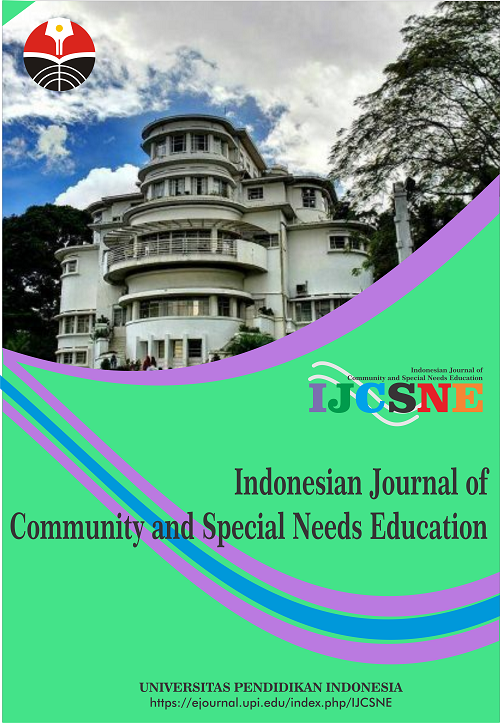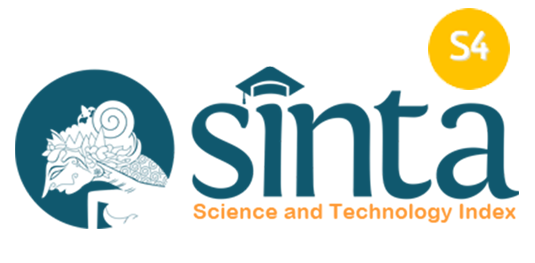Primary School Teachers’ Competence Level in The Early Identification of Gifted Children
Abstract
Keywords
Full Text:
PDFReferences
Abdulla Alabbasi, A. M., A. Ayoub, A. E., and Ziegler, A. (2021). Are gifted students more emotionally intelligent than their non-gifted peers? A meta-analysis. High Ability Studies, 32(2), 189-217.
Baum, S. M., Renzulli, J. S., and Hébert, T. P. (2005). Reversing underachievement: Creative productivity as a systemic intervention. Gifted Child Quarterly, 49(4), 315-335.
Bulajeva, I. (2013). Competences of preschool and primary school teachers: Teachers’ and students’ views. European Journal of Contemporary Education, 12(2), 147-156.
Bulajeva, I. (2013). Professional competencies of teacher: Comparative study of Lithuania and Turkey. Journal of Education and Training Studies, 1(1), 72-81.
Cohen, F., Trauernicht, M., Francot, R., Broekhuizen, M., and Anders, Y. (2020). Professional competencies of practitioners in family and parenting support programmes. A German and Dutch case study. Children and Youth Services Review, 116, 105202.
Dağlıoğlu, H. E. (2004). A comparative study of teachers’ and parents’ opinions on the identification of gifted and talented children. Hacettepe Üniversitesi Eğitim Fakültesi Dergisi, 27, 45-51.
Ford, D. Y. (2008). Reversing underachievement among gifted black students: Promising practices and programs. Gifted Child Today, 31(2), 38-43.
Gubbins, V., and Barrett, E. (2009). Nurturing gifted children in a supportive educational environment. Teaching Exceptional Children, 41(5), 14-20.
Harrison, C. (2003). Identification of gifted students. Gifted Education International, 17(1), 50- 59.
Huang, D., and Moon, S. (2009). Teacher qualifications and student achievement in Hong Kong. Asia Pacific Education Review, 10(4), 497-510.
Huang, Y. and Moon, B. (2009). Teacher qualifications and their impact on student achievement: Findings from Timss 2003 data for Turkey. Educational Research and Evaluation, 15(2), 95-115.
Kerr, B. A., Colangelo, N., and Gaeth, J. (2010). Developing the expertise of teachers of the gifted. Gifted Child Quarterly, 54(2), 78-92.
Kerr, B. A., Colangelo, N., Gaeth, J., and Moreno, A. (2010). Teachers of the gifted and their professional development needs: A statewide study. Journal of Advanced Academics, 21(4), 586-611.
Lu, H., and Zhang, X. (2023). Developing sustainable career paths as teacher-researchers in a changing academic landscape: A tale of two EFL teachers in China. Plos One, 18(5), e0285363.
Plucker, J. A., and Callahan, C. M. (2014). Research on giftedness and gifted education: Status of the field and considerations for the future. Exceptional Children, 81(4), 390-406.
Reis, S. M., and McCoach, D. B. (2002). Underrepresentation of students of color in gifted education: The influence of teacher referrals. Gifted Child Quarterly, 46(3), 151-162.
Sankar-DeLeeuw, N. (2009a). Gifted preschoolers: Characteristics, challenges, and educational options. Roeper Review, 31(3), 138-146.
Sankar-DeLeeuw, N. (2009b). Teachers' identification of gifted and talented students: An empirical study of instructional practice. Journal for the Education of the Gifted, 32(2), 222-253.
Zhumash, Z., Zhumabaeva, A., Nurgaliyeva, S., Saduakas, G., Lebedeva, L. A., and Zhoraeva, S. B. (2021). Professional teaching competence in preservice primary school teachers: Structure, criteria and levels. World Journal on Educational Technology: Current Issues, 13(2), 261-271.
DOI: https://doi.org/10.17509/ijcsne.v4i1.60074
Refbacks
- There are currently no refbacks.
Copyright (c) 2023 Universitas Pendidikan Indonesia

This work is licensed under a Creative Commons Attribution-ShareAlike 4.0 International License.















